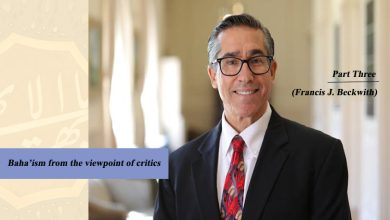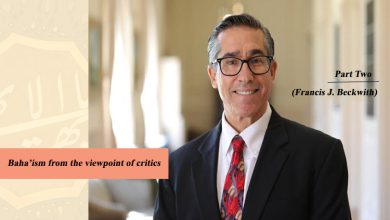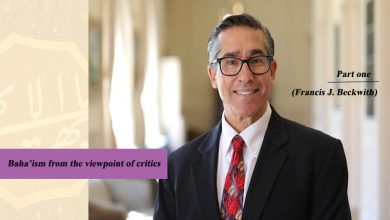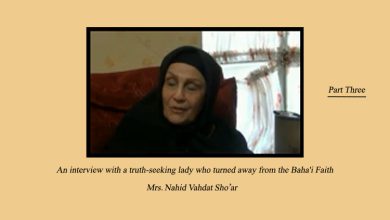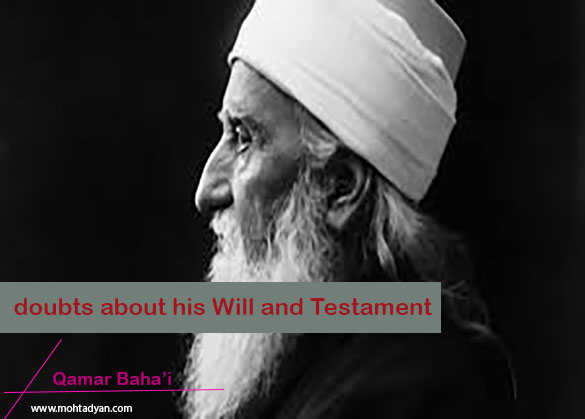
This short article is a declaration that “Qamar Baha’i” wrote in early April 1953 under the title “Abbas Abdu’l-Baha”. The title has been added to it:
Qamar Baha’i has warmly praises’ Abdu’l-Baha and has made no reference to the long-term and fruitless animosity between him and Mohammad Ali Effendi. He claims that the Will and Testament of Abdu’l-Baha is fake, adding that if we accept that the Will and Testament is written by Abdu’l-Baha, his credibility will be diminished. Given the differences between Qamar’s two uncles, he does not mention them in this article, and apparently his motivation for refusing to accept and approve the document of the Will and Testament is partly due to his desire to protect the character of Abdu’l-Baha and the Baha’is; because he was an acceptable figure who talked about the new religion. Qamar Baha’i claims that some people, in pursuit of worldly and personal interests, wrote a will and attributed it to Abdu’l-Baha.
Qamar Baha’i made no reference to the names of these persons. According to Negar (Qamar’s daughter), the narration and story which were prevalent among the family members was that the appointment of Shoghi Effendi Rabbani to the position of “Velayat-e Amr” or guardianship of the nation was the idea of his grandmother, Monira Khanum, the wife of Abdu’l-Baha. It is conceivable that Monira Khanum may have done so with her daughter, Ziaieh Khanum (Shoghi Effendi’s mother), or other close relatives, in order to maintain power behind Shoghi Effendi’s throne; because, as Qamar Baha’i points out, when the Will and Testament was written, Shoghi was very young.
In any case, this possibility may have been confirmed by those who disagree with the institution of the “Velayat-e Amr” in Baha’ism or with the activity of Mr. Shoghi Rabbani in this position, or those who prefer to remove the harsh and belligerent words at the end of this historical document left by Abdu’l-Baha. Otherwise, the theory of forgery remains largely a conjecture without support and documentation.
Editor
********************
Life of Abdu’l-Baha Abbas
Abbas Abdu’l-Baha was born in Tehran at midnight on May 23, 1844, the same year that Bab announced his message to the world. (1)
When Abbas Effendi was nine, his father was arrested and imprisoned. Groups of people attack and looted his house; thus, the family was deprived of its property and suffered from the difficulties and hardships of poverty.
Abdu’l-Baha was so dependent on his father that he acted almost as his bodyguard, because he was always alongside his father, so his father trained him as he wished and sowed the seeds of his principles and teachings in him and left him a strong personality. And he nurtured in him a spirit of humanity and taught him to serve humanity. Bahaullah told Abdu’l-Baha that if wants to be a good Baha’i, he should love the entire human world and universe generally and to make an effort toward world peace, brotherhood and fraternity.
Abdu’l-Baha was graduated from the school of his father, obtaining a strong spiritual character; he was a man of wisdom, prudence, and kindness, a father for the needy and a guide for the lost. He drew his humanitarian teachings and ideas out of the school of life and the storm of hard experiences.
The dictatorial rule of Abd al-Hamid Pasha came to an end in 1908 and the Turkish young officers, announced amnesty for all prisoners. Abbas Abdu’l-Baha in the mid or late sixties of his life got rid of the restrictions imposed on him since childhood. (2)
At that age, Abbas Effendi felt compelled to promote his father’s message, so he traveled to Egypt, Switzerland, France, Germany, Hungary, the United Kingdom, the United States, and Canada to preach others the principles and teachings of his father, which were deeply ingrained in him, and during his visits to those countries, thousands heard his preaching, which was based on his father’s principles, in similar churches and religious institutions, and millions more read about the Bahaullah’s teachings in local newspapers. In this way, he was able to attract men and women of different faiths and religions due to the magnetism of his personality.
His followers loved him very much and he responded their love and tried to raise their moral, spiritual and material standards to the level of his capacities; he also did his best to save the material and moral needy.
The claim that Abdul-Baha’s will was forged
This beloved religious leader, who called himself Abdul-Baha (slave and servant of his father Bahaullah), was guided by his father’s personality and learned the solution to problems, transmitting almost all of his father’s teachings without adding or subtracting anything. Is it believable to you, dear family, that this servant of Bahaullah, this honest and good man, deviates from the path of his master for the sake of his own interests and the advancement of his goals and leadership of the Bahia community?
Some people, pursuing their personal material interests, prepared what they called a will and attributed its content to Abbas Effendi; in which it has been said form the language of Abdul-Baha that he had appointed his grandson, Shoghi Effendi Rabbani, as the spiritual leader of the Baha’is. This grandson, who was a teenage boy at the time (3), was not able to comprehend the dimensions of the great responsibility entrusted to him by those people, and in my opinion, and based on the indisputable documents that I have, he has not been able to understand his responsibility until now too.
These people committed an unforgivable sin against Abbas Effendi, whether it was intentional or unintentional, a will in contradiction with his father’s will. This is really embarrassing, embarrassing. Especially since the sacred nature of the will has been accepted not only by the Shoghis but by all the nations of the world. Moreover, everyone knows that Abbas Effendi, knowing that he had no right to make any changes to the provisions of his father’s will, especially considering that Bahaullah had appointed a successor, who, in the event of the death of Abdul-Baha, the leadership of the Baha’i community is transferred to his brother, Muhammad Ali Effendi. Is it conceivable for him to oppose the Bahaullah’s will?
Those who wrote the will and thought that they had glorified and honored Abbas Effendi, bought for him a defect and shame that even ordinary people also understand, let alone a religious leader; because they portrayed him as a rebellious son who acted contrary to the provisions of his father’s will; the same will that gave him the right to lead. Abdul-Baha. The brothers of Abdul-Baha acknowledged and accepted the authenticity of their father’s will and did not fail to make any effort to propagate the movement.
Abdul-Baha as usual, attended Friday prayers on Friday 25th of November 1921 (4) and personally assisted the poor and needy and returned to his residence. Three days later, on 28th of November, he died, and according to his father’s will, the spiritual leadership of the Baha’i movement was handed over to his brother, Mohammad Ali Effendi. (5)
Writer: Qamar Baha’i
*****
Footnotes:
1-Refer to chapter 8 of the current book and note no. 9
2-The revolution of the young Turks overthrew Sultan Abdul Hamid II, who had imprisoned many in the Ottoman Empire on suspicion of being political and social reformers. Abdul-Baha along with other members of the Bahaullah’s family, was sentenced for decades to stay in the Acre where it is now part of Israel but at that time, it was under the Ottoman rule, and he was held for a time in the city jail. Abdul-Baha was 64 years old at the time of his release, or 67 to 69 years, depending on which of his birth dates was correct.
3- The first part of Abdul-Baha’s will, in which the author appoints Shoghi Effendi as “Vali-e Amrullah” of the leader of the Cause of God, according to sources, was written between 1904 and 1907, during which Shoghi was between 7 and 10 years old.
4-Throughout his life, Abdul-Baha attended the Friday prayers of the Muslims.
5- Certainly, Abdul-Baha had not done so and there were animosity and strife between the two brother for years, although in case of the absence of any will contradictory to the will of Bahaullah, the leadership of the Baha’i Faith had to be automatically transferred to the younger brother in accordance with Bahaullah’s instructions.


